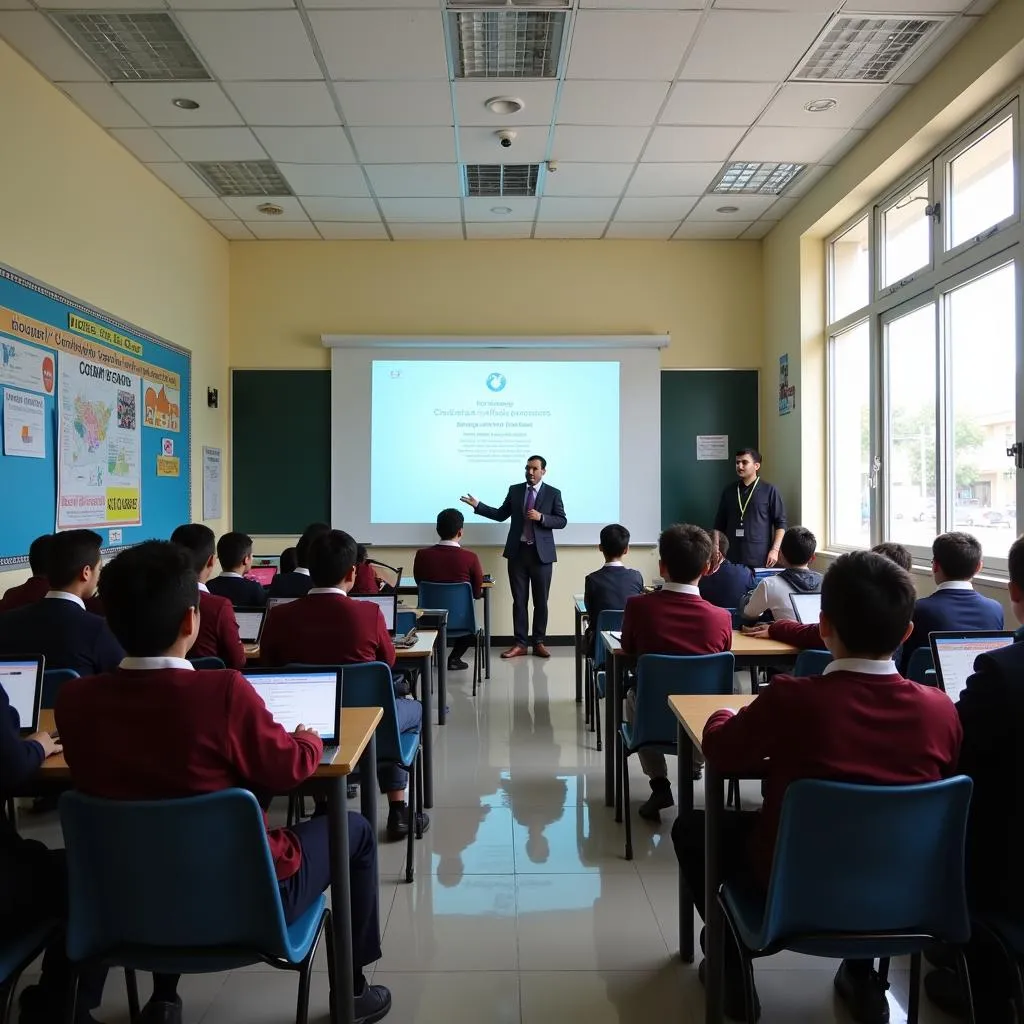The Privatization Of Schools In Pakistan is a complex and multifaceted issue that has sparked intense debate across the nation. This trend, characterized by the increasing presence of private educational institutions, is reshaping the landscape of learning in the country.
Factors Driving the Privatization Wave
Several factors contribute to the rising tide of privatization in Pakistan’s education sector.
- Perceived Quality Gap: One of the primary drivers is the widespread perception that private schools offer superior quality education compared to their public counterparts. This perception is fueled by concerns about the quality of teaching, infrastructure, and resources in many government-run schools.
- Rising Demand for English-Medium Education: There’s a growing demand for English-medium instruction, seen as a gateway to better career prospects in a globalized world. Private schools have been quicker to adapt to this demand, attracting parents seeking an edge for their children.
- Population Growth and Urbanization: Pakistan’s burgeoning population, coupled with rapid urbanization, has placed a strain on the existing public education system. Private schools have stepped in to fill this gap, offering more accessible options in densely populated areas.
 Students in a Modern Private School Classroom in Pakistan
Students in a Modern Private School Classroom in Pakistan
The Implications of School Privatization
The privatization of education in Pakistan carries profound implications, impacting accessibility, equity, and the overall quality of education.
- Accessibility and Affordability: While private schools expand educational choices, their high fees create barriers for a significant portion of the population. This raises concerns about educational inequality, potentially widening the gap between the privileged and the underprivileged.
- Teacher Quality and Accountability: The rapid growth of private schools has led to questions about teacher training and qualification standards. Ensuring teacher quality and accountability across both public and private sectors is crucial for maintaining educational standards.
- Regulation and Oversight: Effective regulation and oversight are essential to ensure that private schools adhere to quality standards and ethical practices. The government plays a critical role in monitoring and regulating the private education sector to safeguard student interests.
Examining the Debate: Pros and Cons
The privatization of schools in Pakistan is a hotly debated topic, with proponents and critics presenting compelling arguments.
Arguments in Favor of Privatization:
- Increased Competition and Innovation: Proponents argue that privatization fosters competition within the education sector, encouraging innovation and improvements in both private and public schools.
- Greater Parental Choice: Privatization expands parental choice, allowing them to select schools that align with their values and aspirations for their children.
- Reduced Burden on the Government: Private schools can alleviate some of the financial burden on the government, freeing up resources for other essential public services.
Arguments Against Privatization:
- Exacerbated Inequality: Critics contend that privatization exacerbates socioeconomic disparities, creating a two-tiered education system where access to quality education is increasingly determined by wealth.
- Erosion of Public Education: The shift towards private education may lead to the neglect and underfunding of public schools, further undermining their quality and accessibility.
- Lack of Transparency and Accountability: Concerns exist about the lack of transparency and accountability in some private schools, potentially compromising educational standards and ethical practices.
 Challenges Facing Pakistan's Education System
Challenges Facing Pakistan's Education System
The Way Forward: Striking a Balance
The challenge for Pakistan lies in harnessing the potential benefits of privatization while mitigating its drawbacks.
- Strengthening Public Education: Investing in public education is paramount. This includes improving teacher training, upgrading infrastructure, and ensuring equitable resource allocation to provide quality education for all.
- Regulation and Accountability: Establishing a robust regulatory framework for private schools is essential to ensure quality standards, transparency, and accountability. This includes setting clear guidelines for teacher qualifications, fee structures, and curriculum development.
- Promoting Public-Private Partnerships: Exploring innovative public-private partnerships can leverage the strengths of both sectors. These partnerships can focus on teacher training, resource sharing, and infrastructure development.
Conclusion: Towards an Equitable and Quality Education System
The privatization of schools in Pakistan is a complex issue with far-reaching consequences. Striking a balance between the roles of public and private education is crucial to building an equitable and quality education system that empowers all children in Pakistan to reach their full potential.
Frequently Asked Questions
1. What are the main reasons behind the increasing privatization of schools in Pakistan?
The main factors include the perceived quality gap between private and public schools, the rising demand for English-medium education, and population growth, putting a strain on public resources.
2. How does school privatization affect educational equality in Pakistan?
While private schools provide more options, their high fees can create barriers for low-income families, potentially widening the educational gap between the rich and poor.
3. What steps can the government take to ensure quality education in both public and private schools?
The government can strengthen public education through investment, implement robust regulations for private schools, and explore public-private partnerships to leverage the strengths of both sectors.
4. What are the potential benefits of private schools in the Pakistani education system?
Private schools can foster competition, encourage innovation, and provide parents with more choices for their children’s education.
5. What are the long-term implications of a largely privatized education system in Pakistan?
Long-term implications include potential exacerbation of social inequalities, underfunding of public schools, and the need for strong government oversight to ensure quality and accountability across all educational institutions.
Need assistance with educational matters in Pakistan? Contact our dedicated team at:
Phone: +923337849799
Email: news.pakit@gmail.com
Address: Dera Ghazi Khan Rd, Rakhni, Barkhan, Balochistan, Pakistan.
We are available 24/7 to provide support and guidance. For further insights, explore our website for related articles and resources.